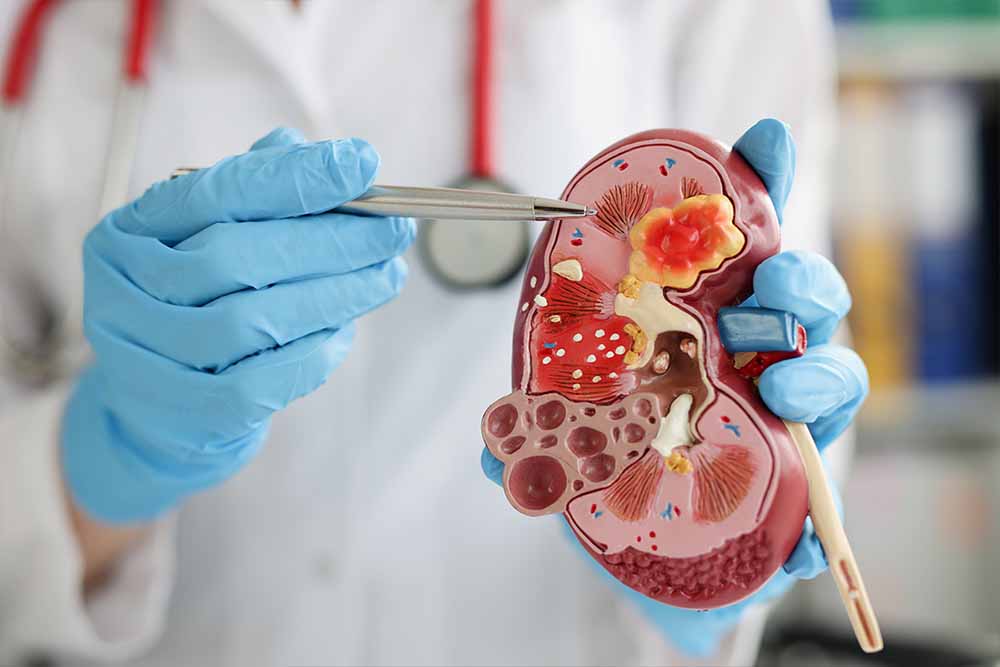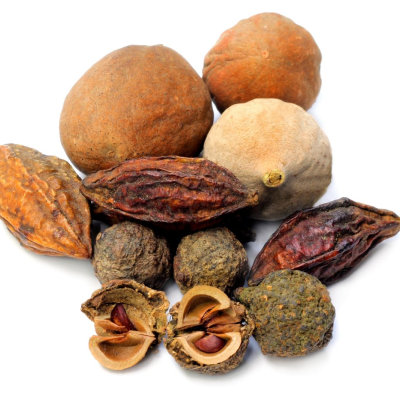Nephrotic Syndrome is a kidney disorder characterized by damage to the glomeruli (filtering units of the kidney), leading to excessive protein loss in the urine (proteinuria), low protein levels in the blood (hypoalbuminemia), high cholesterol levels (hyperlipidaemia), and swelling (oedema).
Functions of the Kidneys
The kidneys are vital organs responsible for maintaining homeostasis in the body. Their primary functions include:
1. Excretion of Waste Products:
- Filter and remove waste products like urea, creatinine, and toxins from the blood, excreting them through urine.
2. Regulation of Fluid and Electrolyte Balance:
- Maintain optimal levels of sodium, potassium, and other electrolytes, along with body fluids.
3. Blood Pressure Regulation:
- Secrete renin, which helps regulate blood pressure through the renin-angiotensin-aldosterone system (RAAS).
4. Acid-Base Balance:
- Maintain blood pH by excreting hydrogen ions and reabsorbing bicarbonate.
5. Erythropoiesis:
- Produce erythropoietin, a hormone that stimulates red blood cell production in the bone marrow
6. Vitamin D Activation:
- Convert inactive vitamin D into its active form, which aids in calcium absorption and bone health.
7. Detoxification:
- Remove drugs, toxins, and metabolic by-products from the bloodstream.
Types of Nephrotic Syndrome
1. Primary Nephrotic Syndrome:
- Originates in the kidneys.
- Examples: Minimal Change Disease (MCD), Focal Segmental Glomerulo-sclerosis (FSGS), Membranous Nephropathy.
2. Secondary Nephrotic Syndrome:
- Results from systemic diseases or external factors.
- Causes: Diabetes mellitus, lupus (SLE), infections, drugs, or cancer.
Causes of Nephrotic Syndrome
Primary Causes:
Glomerular diseases like Minimal Change Disease, FSGS, and Membranous Nephropathy.
Secondary Causes:
- Systemic Diseases: Diabetes, lupus, amyloidosis.
- Infections: Hepatitis B/C, HIV, malaria.
- Medications: NSAIDs, certain antibiotics.
- Genetic Factors: Hereditary kidney conditions.
Symptoms of Nephrotic Syndrome
- Oedema: Swelling in the face, legs, ankles, and around the eyes.
- Foamy Urine: Due to excess protein.
- Fatigue: Resulting from low albumin levels.
- Weight Gain: From fluid retention.
- Loss of Appetite.
- High Cholesterol and Triglycerides.
Diagnosis of Nephrotic Syndrome
1. Laboratory Tests:
- Urine Analysis: Detects proteinuria and abnormal urine sediment.
- Blood Tests: Measures serum albumin, cholesterol, and creatinine.
2. Kidney Biopsy:
- Helps determine the underlying cause and extent of kidney damage
3. Imaging:
- Ultrasound or CT scan to evaluate kidney structure and function.
Ayurvedic Perspective of Nephrotic Syndrome
In Ayurveda, nephrotic syndrome corresponds to Mutravaha Srotas Dushti (urinary system disorders) and is often linked to imbalances in Kapha and Pitta doshas. The accumulation of Ama (toxins) in the body and impaired kidney function disrupt the body’s homeostasis.
Pathogenesis:
- Weak Agni (digestive fire) leads to Ama formation.
- Accumulated toxins obstruct the Srotas (channels), impairing kidney filtration.
Dietary Recommendations:
- Consume light, easily digestible foods like soups and porridge.
- Avoid salty, processed, and fried foods.
- Include kidney-supportive foods like barley water, bottle gourd (lauki), and coconut water.
- Limit protein intake to reduce kidney load.
Lifestyle Modifications:
- Practice Pranayama and meditation to reduce stress.
- Avoid smoking and alcohol.
- Engage in mild physical activities to enhance circulation.
Panchakarma Therapies:
Virechana (Therapeutic Purgation):
- Eliminates Pitta and toxins from the body.
Basti (Medicated Enemas):
- Cleanses the urinary system and balances Vata dosha.
Rakta Mokshana (Bloodletting):
- Beneficial in systemic conditions affecting kidneys, like lupus.
Herbal Remedies:
Punarnava (Boerhavia diffusa):
- Reduces swelling and supports kidney function.
Gokshura (Tribulus terrestris):
- Improves urinary function and reduces inflammation.
Varun (Crataeva nurvala):
- Aids in clearing obstructions in the urinary tract.
Triphala:
- Helps detoxify and maintain kidney health.
Shatavari (Asparagus racemosus):
- Rejuvenates kidney tissues and improves overall function.
Formulations:
- Chandraprabha Vati: Balances doshas and supports urinary health.
- Punarnavadi Kashaya: Reduces edema and improves kidney function.
- Gokshuradi Guggulu: Promotes healthy urination and detoxification.
Ayurvedic therapies can complement conventional treatments, such as corticosteroids and diuretics, by improving kidney health and reducing side effects. Periodic monitoring by a healthcare professional is essential.








